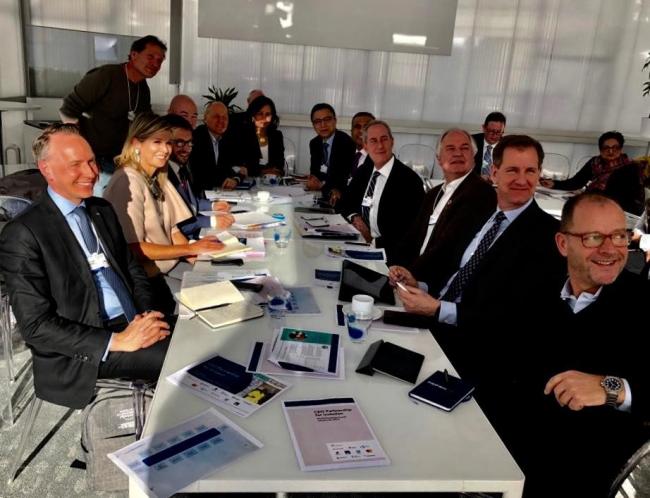
By Eric Duflos
Last month in Davos, at the invitation of Queen Máxima of the Netherlands, the UN Secretary-General’s Special Advocate for Inclusive Finance for Development (UNSGSA), the leaders of ten leading global companies gathered to share early results from a novel initiative aimed at increasing financial inclusion while improving bottom lines. As the director of the UNSGSA Office, I was truly inspired by the discussion on the progress made just a year after the launch of the CEO Partnership for Inclusion (CEOP).
During that time, the CEOP has already sparked several collaborations between its member companies. Two of them, one between Telenor and Unilever, and the other between Telenor and PepsiCo, are hitting the ground now in Pakistan. Small merchants who sell Unilever and PepsiCo products are now using faster and cheaper payment instruments provided through Telenor’s mobile wallet EasyPaisa. Using this product to buy inventory also ensures that these merchants will soon get easier access to credit thanks to the digital footprint they are establishing. The two consumer goods companies will be able to sell more inventory to the merchants, and Telenor will enroll more users. It’s a “win-win-win” proposition.
The 10 multinational companies in the CEOP hail from the banking, fintech, telco, and fast-moving consumer goods (FMCG) sectors. The purpose is to create private-private partnerships that improve each company’s bottom line, while bringing their customers into the formal financial system. In the next three months, Airtel, AntFinancial, AXA, Banco Santander, MasterCard, and Rabobank will launch six other partnerships in Asia, Africa, and Latin America, targeting farmers, migrant workers, and small enterprises.
Why does this matter for the unbanked and the under-banked? As highlighted by the UNSGSA at the CEOP’s public event in Davos, the private sector has played a major role in financial inclusion, and we need a lot more innovation to take place. According to the SME Finance Forum (a creation of the G20 countries managed by IFC), 40 percent of formal micro, small and medium enterprises (MSME) in developing countries, have an unmet finance need—totaling $5.2 trillion a year.
“Tech companies, mobile network operators, and even consumer goods companies can contribute to and benefit from financial inclusion, making it financially sustainable for the companies,” said the UNSGSA during the public event.
I was impressed by the CEOs’ enthusiasm about doing business differently—even taking the risk of working with partners who are sometimes their competitors. They recognized that customers need more than one company to fulfill all their financial needs, and that bringing a joint value proposition can be a win for everyone. Dan Schulman from Paypal said, “It is easier to do it alone, but one company does not have the full proposition that a customer needs.” Eric Jing from AntFinancial emphasized that same point when he said, “If you want to go fast, work alone, but if you want to go far we need to walk together.”
During our private meeting with CEOs, the UNSGSA asked them what’s needed to scale up these efforts. Beyond their own leadership, the CEOs told us they need dedicated country teams who see the commercial benefits of the partnerships on the ground, with a business case that works for the customers and the companies involved. This seemed to be the most crucial success factor.
By working together, the CEOP members have also become more customer-centric as they share their different perspectives about the same customers. Several CEOs also believe that reaching scale will demonstrate the value of their joint work to governments and to other companies. A conducive policy environment is essential for these initiatives to thrive.
On a personal note, it is exciting to work with such committed and forward-thinking leaders, as well as the many talented high-level advisors from each company who are lending their insights to the initiative. They are instrumental in making the partnership move from commitment to action.
It’s way too early to claim victory as we only have two partnerships in the pilot phase, but already we are seeing a new way of doing business emerge. My hope is that the CEOP will start to reach scale in the next couple of years and will inspire many more CEOs to launch similar efforts.
Eric Duflos is the Director of the Office of the UNSGSA.